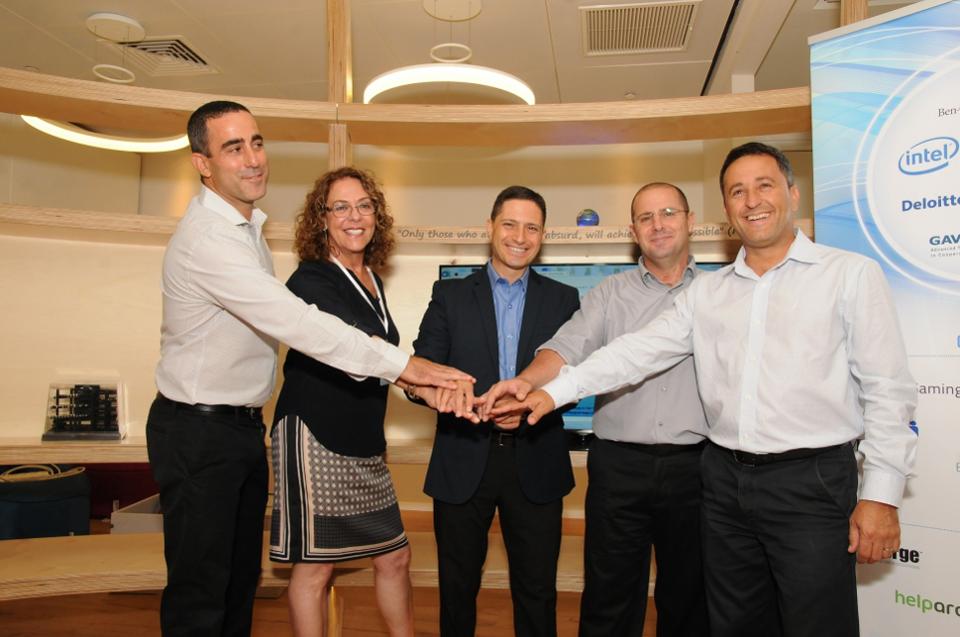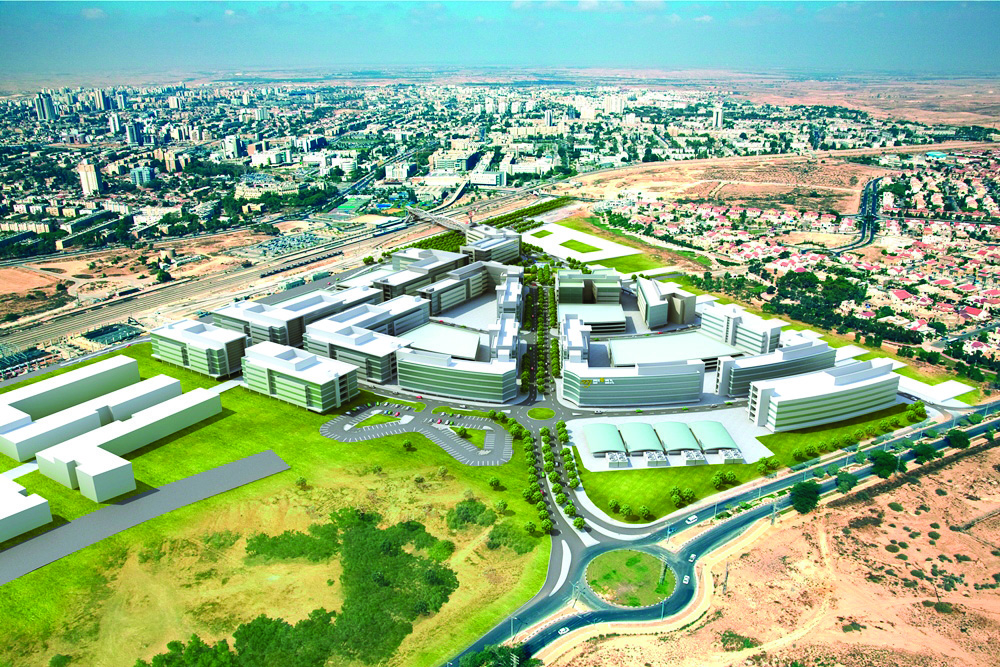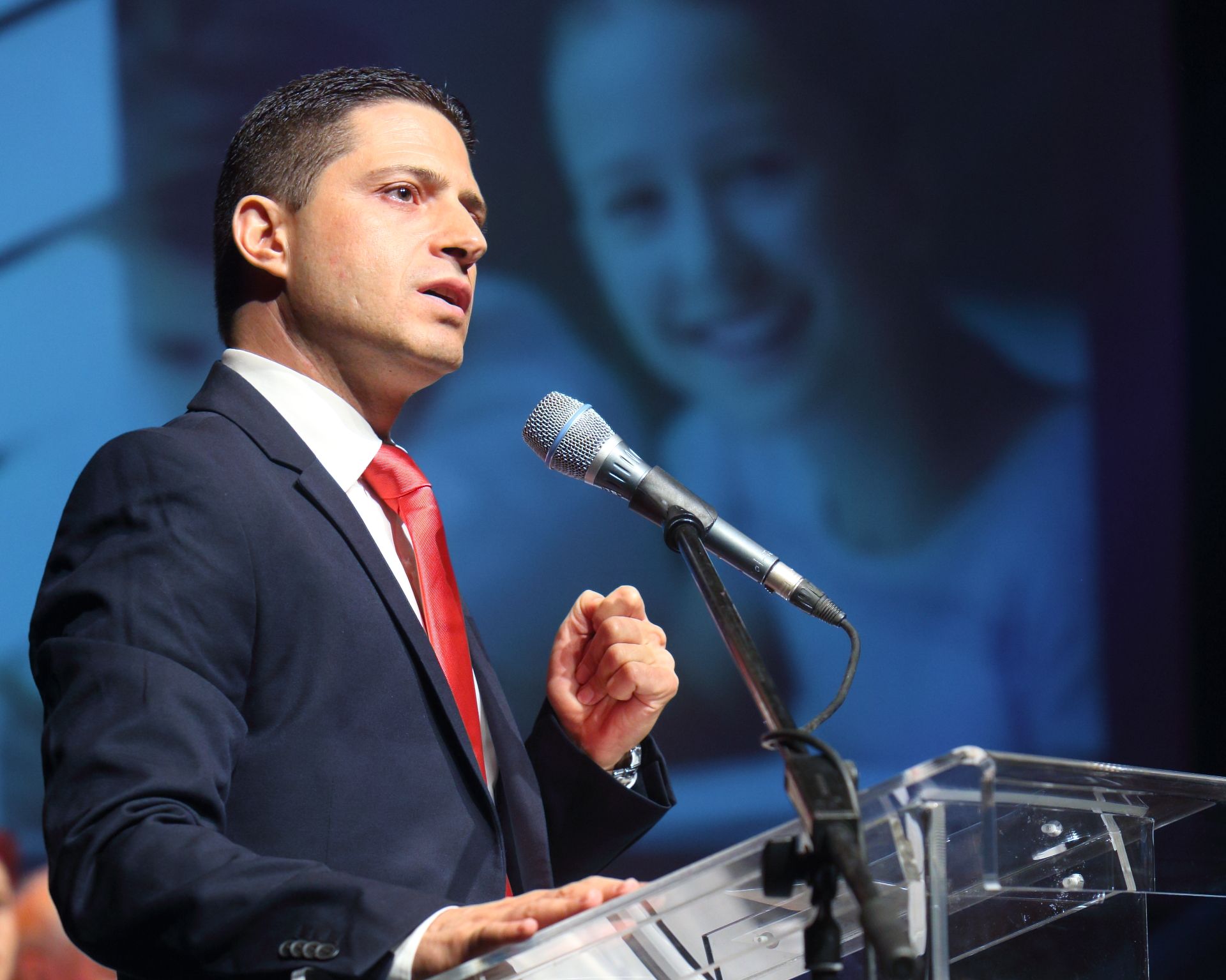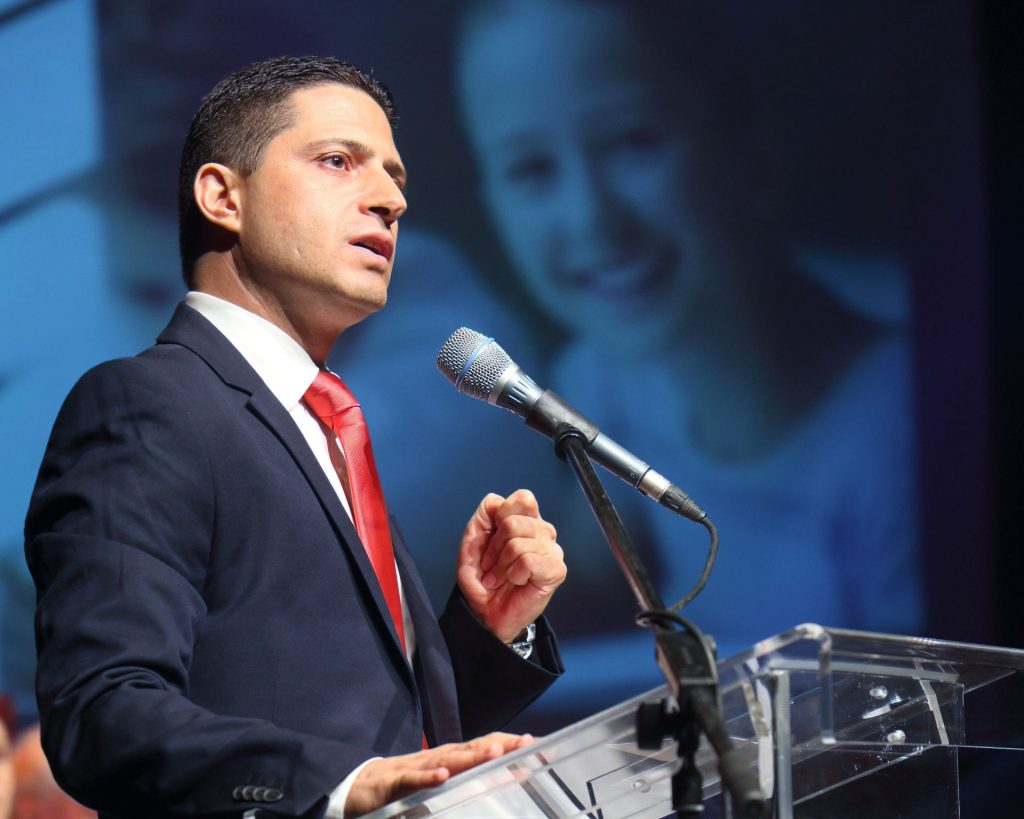With the Intelligence and Communication corps transferring to the city, a successful university, and a brand new entrepreneurial center, it seems that even the greatest skeptics are beginning to understand that the Mayor of Be’er Sheva, Rubik Danilovich, is not hallucinating when he declares that “the city will be a world-class innovation leader”.
Name the first three things that come to mind when you think of the Israeli Negev desert. If you came up with words like dust, poverty and camels, you are thinking of the old Be’er Sheva. If, on the other hand, you thought of words like IT, innovation and entrepreneurship, your name might be Rubik Danilovich. The energetic mayor of Be’er Sheva is hoping that, in the near future, he won’t be the only Israeli who associates the “Capital of the Negev” with words that today more often bring to mind Tel Aviv or Jerusalem. He believes the city is set to become world-renowned as a center of innovation and technology, a far cry from the shabby desert image it has endured during his tenure.
“I remember growing up with the stereotypes, the prejudice and the condescension,” he says in an interview with Forbes Israel. “I remember playing away games with my youth soccer league when the opposing team would call us the ‘desert rats.’ I’m still Rubik from the Gimel neighborhood, I grew up in a 44 square meter apartment in a family of five, when Be’er Sheva was a dusty desert town. Today I look at the city and I see big changes. And this is only the beginning – I’m sure of it.”
Danilovich, the first Be’er Sheva native to become its mayor, is one of those responsible for the city’s ongoing metamorphosis, and which, under his strategic program, will continue to intensify in the coming years. Among those contributing alongside Danilovich are former Knesset member and Ben-Gurion University president Avishay Braverman, current university president Professor Rivka Carmi, and several senior city and government officials. “It may be hard to believe, but we put our egos aside,” he says. “What we’ve created here is an ecosystem, not an ego-system. This is not a one-man show. It’s the collaboration between us that has made it possible to ignite this process.”
Danilovich began to promote a joint project with national government offices during his first year as mayor. After he took office in late 2008 (during Operation Cast Lead, as the city hunkered down under its first ever rocket attacks), Danilovich turned to the Treasury Ministry’s budget department with a simple request: stop the “budget grants” (which the government issues to towns struggling to maintain budgetary balance). “The way I see it, these grants only reinforced our image as a city that can’t take care of itself,” he explains. “Instead we asked the government to give us ‘mega projects’ that could change the lives of residents in the long run.”
Be’er Sheva – Stop the Skeptics
These mega projects include, among others, one of the most ambitious visions the city has seen in many years: reinventing Be’er Sheva as a global innovation hub. “There was a lot of skepticism at first,” he continues. “People didn’t believe in us, laughed at us – they didn’t believe the companies would want to come to the Negev. But I believe enthusiasm is everything. The way I see it that’s leadership – to be ahead of your time and to bring a totally new vision. When people saw our enthusiasm and realized we were serious about this, they wanted to take part.”
What about money? Danilovich is outspoken on the issue. “There’s always money. Any public servant who says there is no money for a given project should go home,” he says. “Sure, maybe a boring, unimaginative NIS 100,000 project won’t get you funding. But if you show a project that could bring about a real change, one valued at, say, NIS 1 billion, people will be interested in investing. We’re thinking big. That’s how it is – if you think small, you get small results. So maybe some of these visions will take decades to realize and maybe we won’t be here to cut the ribbon, but that doesn’t mean we’re not going to plan and build the foundation today.”
A Bridge between Business and Academia
Danilovich continues to plan for the future, but there are already changes on the ground. A spacious technology park has just opened in the northern part of the city, adjacent to the university. No fewer than 20 buildings are expected to be built there in the coming years, including the newly established National Cyber Bureau, which was announced by Prime Minister Netanyahu this year.
As part of planned unit transfers to the Negev, the IDF’s cyber security division will set up shop a stone’s throw away from the tech park, and military intelligence will be headquartered a few minutes’ drive away at Laqiya Junction. “For the first time in many years the government is mounting a national project here, and it is making a clear statement – we want to bring all of the country’s best minds together in Be’er Sheva and make it a beacon not only nationally, but globally. This is happening today, and it will continue to intensify in the future,” Danilovich says.
If all goes according to plan, the city will be home to an unusual multi-sector partnership that is almost unheard of anywhere in the world. The university, a technology park hosting several of the world’s leading tech companies, the IDF’s IT and intelligence bodies, and the National Cyber Bureau will all link up in northern Beersheba. And it is this academic-corporate-military consortium, city officials believe, that will transform Be’er Sheva into a global innovation magnet. Danilovich is already calling it the “Silicon Valley of the Middle East.”

Dream Big, Earn Big
And it turns out that the partnership project is going forward without the direct involvement of the municipality. One example of this momentum is the brand new Center for Digital Innovation (CDI) recently built in the technology park.
The huge complex was established with the collaboration of University President Carmi and entrepreneur Ziv Ofek, who knows a thing or two about getting this sort of project going. Not long after completing his studies at Ben-Gurion University, he had already managed to found the company dbMotion, which later sold for $235 million.
Now, Ofek says, it’s time for the next venture – one that will help boost Be’er Sheva’s growth as an emerging technology hub. In the first stage, he explains, the center’s focus will be on digital health. Later, its operations will expand into welfare, education and digital cities.

“We want all the wonderful students who study here to choose to stay here after finishing their studies,” Ofek says. “We want students to see Be’er Sheva as fertile ground for developing themselves and realizing their dreams. This is why we built the Center here.”
According to Ofek, the close link with the university gives the Center a huge – and unusual – advantage. “I’m a research freak,” he confesses. “But as an entrepreneur I don’t have a clue about what’s happening in the world of research. Researchers and academics are the ones who see the big picture and know the issues on the ground. Historically, innovation has always come from academia, and that’s what we want to build here – we want to be a bridge between the worlds of academia and entrepreneurship.”
Business is not an Abstract Concept
The bridge Ofek is talking about is more than an abstract concept. Recently, the city built a bridge shaped like a DNA helix, connecting the university campus to the technology park and CDI. Carmi, long considered one of the most influential women in Israel, understands the value of the collaborative project – and is the one who encouraged the university to take part.
“From our perspective the idea is simple: to bring students and faculty closer to industry and to the application of academic research,” she explains. “The model we’ve set up here is unprecedented in Israel, and there are not many like it elsewhere in the world. Even the best known example of such a joint venture, between Silicon Valley industries and Stanford University, owes more to geographic proximity than to a planned collaboration. Here, if an entrepreneur needs questions answered or wants to hire an employee, he’s literally across one bridge from the university. Within a few minutes, he could hire a student to do a specific job, or find an available consultant to address all kinds of issues.”
“We are not just planning partners; we are also business partners,” Carmi continues. “The university has invested in the Center, so it’s in our interests for the park to succeed and flourish. But the motivation for us is not profit – it’s innovation. The traditional role of academia is to create knowledge, but we believe that playing an integral part in its application is no less important.”
“Standing on Your Head to See the Future”
The road to Be’er Sheva’s transformation into a global innovation center is long, but the steps Danilovich, Karmi, Ofek and others are taking today are already echoing around the world. The group received the go-ahead just under a year ago, when Brandeis University published a study that surveyed future technology hubs. It rated Be’er Sheva first among the seven cities studied.
Since then, Danilovich’s office has become a kind of pilgrimage site – mayors of cities throughout the world have been coming to see how Be’er Sheva’s technology revolution happened in such a short time. Managers and chairpersons of big tech corporations – such as EMCand Lockheed Martin – have been coming as well.
“Make no mistake,” Danilovich declares, “they aren’t coming here as philanthropists. These people are coming because they see opportunity here – they see potential. And that’s why all these companies have set up R&D centers and laboratories here.” Some of the companies that have already booked spots in the technology park are Deutsche Telekom, EMC, Jerusalem Venture Partners, Oracle, Lockheed Martin, IBM, Elbit Systems, Ness Technologies – and the list goes on.

“All these companies know why they’re coming here,” he continues. “Be’er Sheva turns out more engineers than anyplace else in Israel, with over 8000 engineering students in the city [at Ben-Gurion University and Shimoon College of Engineering]. We charge unbelievably low rates, lower than anywhere in the country. But the important factor is investment, human capital and collaboration between the different players.”
Among the heaps of books, pictures and the aerial photos that adorn the library in Danilovich’s office, one can’t help but notice a big bronze statue of Israel’s first Prime Minister David Ben-Gurion, in a signature pose – doing a handstand. Danilovich glances at the statue and smiles. “You know, the greatest leader of the 20th century was one of ours – Ben-Gurion. Five feet tall, but a giant. When he wanted to see the future, he would stand on his head – so he could look at things from a new angle. That’s what we’re trying to do here.”
A City Set on Becoming a World Tech Icon
Be’er Sheva is the dream and opportunity capital of Israel, Danilovich says. “A bit like the US, we’re a city of immigrants. We’ve absorbed immigrants from 80 countries over the years, and we see all of them as equals. Everyone comes here with a dream. What other city would elect a 37-year-old mayor who likes to wear jeans to the office? It’s no accident that Ben-Gurion University is the only one in Israel with a woman president. That’s the story of this city – there are opportunities here for everyone. And that is the spirit that’s attracting the young entrepreneurs who aren’t afraid to come here and put their dreams on the line.”
What’s more, city officials aren’t satisfied with just pulling in entrepreneurs from central Israel – they want Be’er Sheva natives to become a serious force in the technology industry in the coming years. They have set up cyber tracks in many of the city’s high schools, and one new school will have a dedicated technology focus. Danilovich believes that Negev residents will form a much more significant part of Israel’s entrepreneurial and technology community in the future.
“I’m very optimistic,” he says, smiling. “I’m really excited to see what’s happening in this city. We’re one of the few cities in the world that are creating their own future;We’re a city that is set to become a world technology icon; We’re already quite strong in the cyber arena and we’re getting stronger. As I said earlier, we’re always thinking big – and planning ahead. What was it that Ben-Gurion said? That the Negev would be the testing ground of the Jewish people. So if we manage to achieve even 5% of Ben-Gurion’s vision – that would be a fantastic accomplishment.”
This article appeared in the September 2015 issue of Forbes Israel
Translated by Noam Primak





